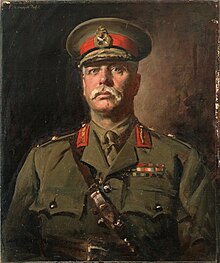Charles Frederick Cox
|
Major General Charles Frederick Cox CB, CMG, DSO, VD |
|
|---|---|

Portrait of Brigadier General Charles Cox, 1921
|
|
| Senator for New South Wales | |
|
In office 1 July 1920 – 30 June 1938 |
|
| Personal details | |
| Born |
2 May 1863 Pennant Hills, New South Wales |
| Died | 20 November 1944 (aged 81) Croydon, New South Wales |
| Political party | Nationalist Party of Australia |
| Military service | |
| Nickname(s) | Fighting Charlie |
| Allegiance |
|
| Service/branch | Australian Army |
| Years of service | 1891–1923 |
| Rank | Major General |
| Commands |
New South Wales Lancers 3rd New South Wales Mounted Rifles 6th Light Horse Regiment 1st Light Horse Brigade 4th Light Horse Brigade 1st Cavalry Division |
| Battles/wars | |
| Awards |
Companion of the Order of the Bath Companion of the Order of St Michael and St George Distinguished Service Order Volunteer Decoration Mentioned in Despatches (5) |
Major General Charles Frederick Cox, CB, CMG, DSO, VD (2 May 1863 – 20 November 1944) was an Australian Army officer and politician. He retired in 1923 as an honorary major general.
Charles Frederick Cox was born on 2 May 1863 at Pennant Hills, New South Wales. He was a grandson of William Cox. He was educated in Parramatta and became a clerk with the New South Wales Railways traffic audit branch in 1881.
Cox enlisted in the New South Wales Lancers in 1891 and was commissioned as a lieutenant in 1894. In 1897 he was chosen to head a detachment of the regiment in the ceremonies for Queen Victoria's Diamond Jubilee. He married Minnie Elizabeth Gibbons on 7 March 1894. Promoted to captain in 1897, he travelled to England again in 1899 in command of a squadron of the lancers for training with the British cavalry.
The squadron was training alongside the 6th Dragoon Guards (Carabiniers) at Aldershot, England, when the Boer War broke out. Cox volunteered himself and his squadron for service in South Africa. Some 70 of his men went to South Africa; another 31, for various reasons, did not, and returned to Australia. Cox and his volunteers arrived in Cape Town in December 1899 and were the first colonial volunteers to arrive in Cape Town.
...
Wikipedia
